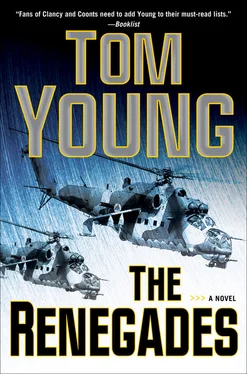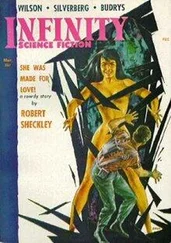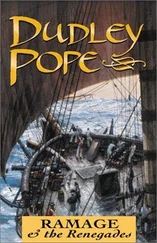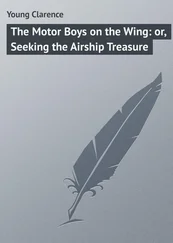Yeah, Parson thought, but you can keep stomping. He wondered if terrorist groups like Black Crescent, the Taliban, and al-Qaeda were accidents of history, things not supposed to happen. And if they were accidents, were they like accidents in aviation? The result of a chain of mistakes and missed opportunities that line up just the wrong way and lead to disaster? If one link in the chain had broken, if one thing had happened differently, then the catastrophe would not have taken place. He knew pilots who would give anything to go back in time and add power three seconds earlier, or reset that altitude alerter and not transpose the numbers.
“Sir,” Gold said. “You know I can help get these guys.”
Parson looked at her hard. Wasn’t this settled? Then he raised his eyebrows, just to soften his expression. He didn’t want to be angry with Sophia—or at least he didn’t want her to know he was angry.
“Sir, what are y’all talking about?” Blount asked.
“She got some good intel up at that refugee camp in Samangan,” Parson said.
“I heard about that,” Blount said.
“Well, now she wants to go back in there to a village to get some more intel, but she wants to go by road.”
“What did you tell her?”
“Not no , but hell, no .”
Blount kept silent for a moment. “What if some Marines go up there with her?”
Now Parson was even more annoyed, but he held back his temper in a way he could do for no one except Sophia. “I know you two are smart people,” he said. “So what part of no do you not understand? It means negative .”
“Sir, do you know about the Lioness teams?” Blount asked.
“The what?”
“Lioness teams. Female engagement teams in the Corps. Women Marines who speak the language, know the culture. They do a lot of what the Sergeant Major here does; they just haven’t done it as long as she has.”
“What about them?” Parson asked.
“If you okay it, we could hook her up with Lioness. I’ll see if my CO will let part of my platoon escort them up there. So the Sergeant Major wouldn’t go by herself, and she wouldn’t be the only one who speaks Pashto.”
Parson hated the idea. He was still haunted by the last time Gold had been torn from his sight when they were supposed to be together. He had watched helplessly, tied to an overturned chair, as they dragged her away. That image still woke him up at night.
Emotions. They got in the way of the mission. You’re not supposed to let that happen, he told himself. But you’re not supposed to let people take unnecessary risks, either. Where was the link in the accident chain? Would this asshole who called himself Chaaku become the next bin Laden? Do you have the means to stop him right here?
“You say you’ll go with her?” Parson asked.
“Yes, sir,” Blount said.
“All right, listen. You check with your CO and these lion women. She can go only if you and your whole squad go with her. In MRAPs, too. Not some light-ass Humvees.”
“Yes, sir.”
“Rashid and I have to fly tomorrow,” Parson continued. “Gold can stay here and work it out with you jarheads. But if I get back and I find out she’s gone with anybody but you, in anything but an MRAP, I will kick your ass all over this airfield no matter how big you are.”
“We’ll take care of her, sir.” Blount smiled. “Sir, did you ever consider being a Marine?”
“Hell, no,” Parson said. “Do I look crazy?”
Gold saw a lot of her younger self in Lance Corporals Lyndsey Meacham and Ann Woolrich. Both women were in their early twenties, so Gold had more than a decade on them. Their military bearing and courtesy never wavered; they answered every question with “Yes, Sergeant Major” or “No, Sergeant Major.” However, Blount had misunderstood their language ability. They spoke a few words of Pashto, but unlike Gold, they had not studied at the Defense Language Institute.
What Pashto they knew they had picked up on the job in the Lioness program. The Lionesses could come from any Marine Corps job specialty. They were originally intended to search local women, who, under cultural norms, could not be searched by men under any circumstances. But their role had expanded to include more than searches. Ann and Lyndsey told of accompanying infantry as the men kicked in doors. The Lionesses would talk to the women inside, with or without interpreters. Lioness teams had lost at least three of their number to roadside bombs, and Gold imagined history would record them as the military granddaughters of the WACs, WAVEs, and WASPs of World War II.
The two younger women sat across from Gold in the back of the Cougar MRAP vehicle. They wore Marine Corps camo like Blount and his men, and they carried full-sized M16A2 rifles, larger than Gold’s M4. Each wore the standard Kevlar combat helmet and body armor, with spare magazines in pouches at the front of the armor. Both had tied their hair in long ponytails instead of tight buns. Given their role, Gold presumed they wanted to make their gender immediately apparent. A private took the wheel, and Blount rode in the right front seat. A gunner manned the .50-cal in the turret. Gold could see only his boots and legs.
She carried her usual field gear, with one other piece of equipment. One of her pouches contained a Blue Force Tracker, an electronic device that looked like a handheld GPS. It was that, and more. The BFT let the command post know her position at all times, and it could send and receive text.
Gold also brought an item to use as a gift for villagers, a token to ease the conversation along, if things went well enough to have a conversation. She’d talked one of the camp’s cooks out of a twenty-four-ounce bag of Domino sugar.
When the driver started the engine, the diesel clatter sounded to Gold like an incantation, a prayer for safe passage. The rear ramp clanged shut, and she heard two other Caterpillar engines rumble to life, the rest of Blount’s team in a pair of identical Cougars.
The MRAPs rolled from their parking spots on the tarmac, through a sandbagged checkpoint with unsmiling Afghan sentries, and out onto a perimeter road left crumbling by the earthquake. Gold watched through steel louvers that shielded windows of bulletproof glass as thick as her thumb. She knew the ride might take at least two hours, though her destination was less than eighty miles away. It all depended on the condition of the roads.
The paved portion of the route did not last long. The three Cougars, Gold’s in the middle, jounced onto a dusty road that amounted to only two ruts across a rock-strewn valley floor. They passed a small village—just four houses of stacked shale. A cow grazed behind the stone huts, ribs visible underneath its hide.
The village gave way to a qalang —a flat expanse of wheat. The wind picked up, and the wheat stalks bent and flowed like green-amber breakers on an inland sea. Beyond the fields, the terrain began to rise and the road to twist. The rough path hurt the bones in Gold’s hips, and her shoulders strained against the aircraft-style harness; the Cougar’s suspension offered strength, not comfort.
“So how much did they tell you about this mission?” Gold asked.
“Not much,” Ann said.
“Only that we would talk to some women in a village, and you didn’t want to go in loud with helicopters,” Lyndsey added.
“That’s right,” Gold said. “And do you know about this new insurgent group?”
“They briefed us that there have been attacks from something called Black…” Ann seemed to struggle for the word.
“Black Crescent,” Gold said. “The Taliban played too nice for them, so they went into business for themselves.”
Читать дальше












